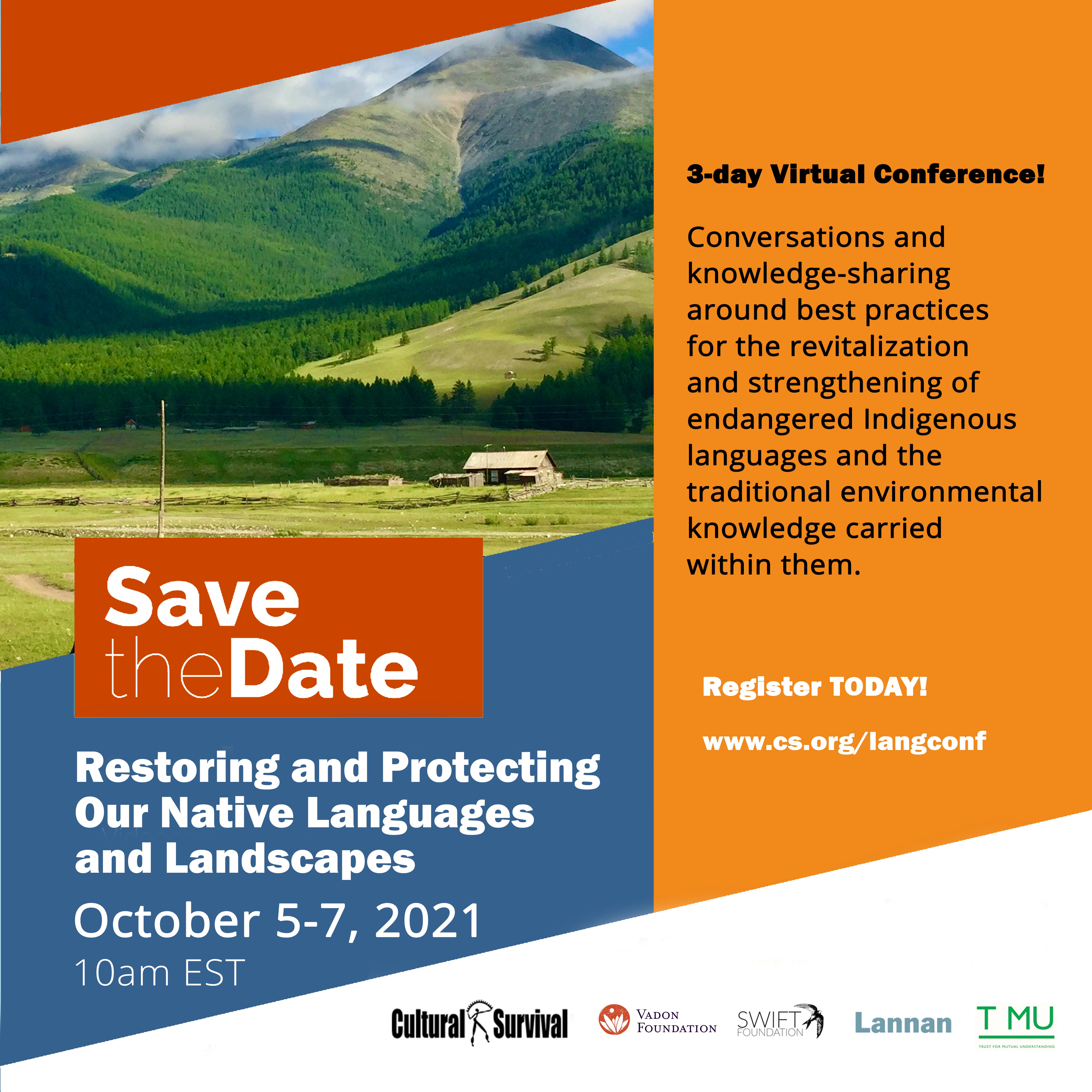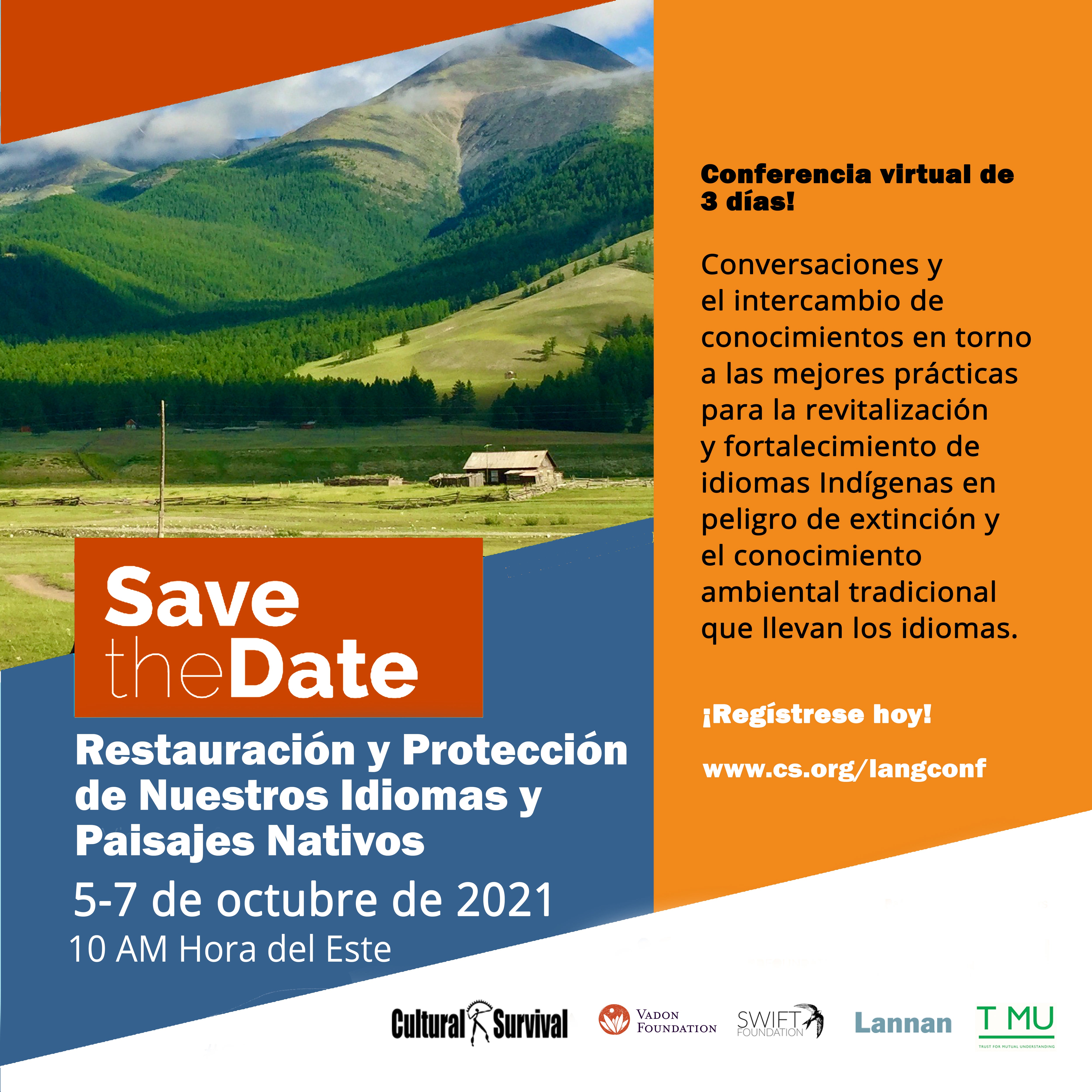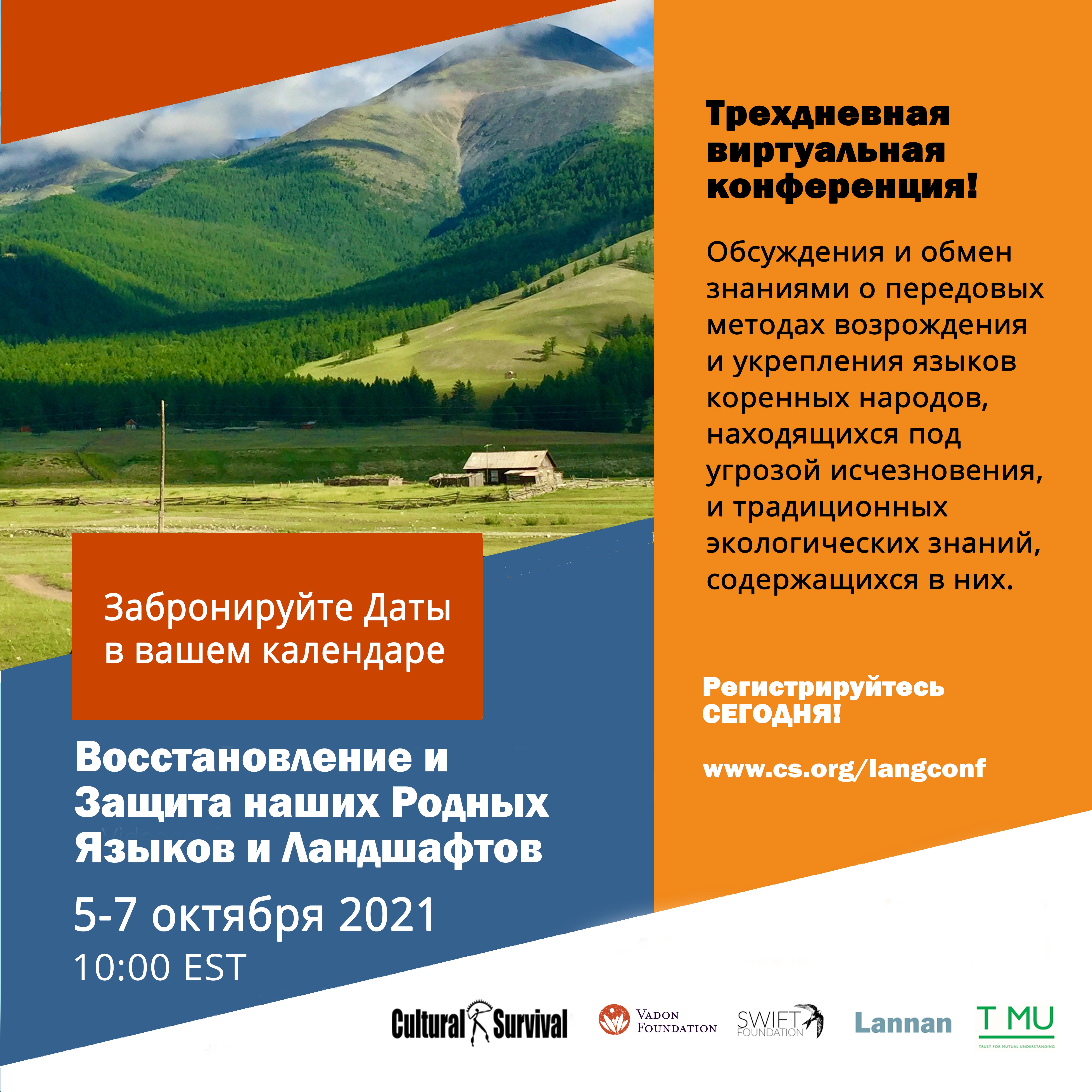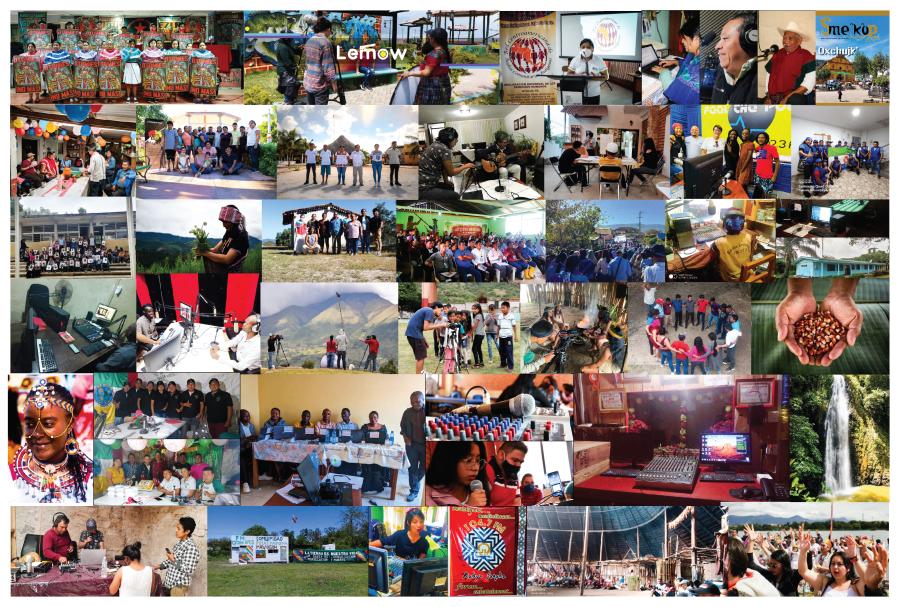
En español abajo
на русском ниже
In light of the upcoming UN International Decade of Indigenous Languages, Cultural Survival announces its virtual conference "Restoring and Protecting our Native Languages and Landscapes." At Cultural Survival, we recognize that Indigenous Peoples themselves must lead the revitalization efforts and claim ownership of their languages and cultures. This conference will equip individuals working at the community level with tools for language revitalization by joining leaders from different parts of the globe working on these issues.
On October 5-7, 2021, Cultural Survival will host a 3-day virtual conference that will convene conversations and knowledge-sharing around best practices for the revitalization and strengthening of endangered Indigenous languages and the traditional environmental knowledge carried within them. To make this event more accessible, registration will be free of charge.
Joining the conference will be Indigenous linguists, educators, and practitioners working in the field of Indigenous language revitalization. Discussions will demonstrate why language revitalization and biodiversity protection are inextricably linked, and present methodologies, practical ideas, and solutions for the best ways to carry forward the work of revitalizing, protecting, and sustaining language, culture, and land holistically.

Conference Tracks
Join conversations around language revitalization practices, methodologies, and grassroots efforts to increase the number of Indigenous languages speakers in the United States, Canada, Central, and South America, and Russia.
Day 1 (October 5, 2021): Indigenous Languages as Contributors to the Preservation of Biodiversity
There is a fundamental connection between Indigenous languages and Traditional Knowledge and how they relate to biodiversity conservation. According to UNESCO, Indigenous communities have developed classification systems in the natural world that are intricate and demonstrate a deep understanding of their local environments. This environmental knowledge is embedded in traditional practices and reflected in Indigenous names and oral traditions. These invaluable understandings are at high risk of being lost when an Indigenous language disappears.
The preservation of Traditional Knowledge and Indigenous languages used to transmit such knowledge is crucial to preserving biodiversity.
Day 2 (October 6, 2021): Reclaiming and Strengthening our Indigenous Languages Beyond our Homes
The most critical measure of language revitalization is the creation of new speakers. Aside from families carrying the language forward within their homes, Indigenous language immersion schools, public bilingual schools, Master-Apprentice programs, and other language learning spaces are crucial to keeping a language alive. Discussions will present effective methodologies, practical ideas, and successful strategies for implementing best practices for carrying forward the work of reclaiming our languages, cultures, and lands in a holistic manner that affirms our traditional understandings.
Day 3 (October 7, 2021): Indigenous Women and the Power of Community Storytelling
Indigenous women are guardians of our Traditional Knowledge and cultures and play a vital role in the reclamation and revitalization of Indigenous languages. Indigenous women are knowledge keepers of traditional medicines, livelihoods, health, and well-being. The role of Indigenous women in the transmission of Traditional Knowledge through ceremonies, medicinal plants, dances, arts, and proper relations to the land is often expressed through language and storytelling. Women’s leadership in the transmission of Indigenous languages to younger generations is crucial for the well-being of Indigenous communities and the environment.
The conference is now full, but you can still watch the panels on our facebook page and youtube channel. For more information, please contact adriana.hernandez@cs.org. Interpretation will be provided in English, Spanish, and Russian.

Restauración y Protección de Nuestros Idiomas y Paisajes Nativos
A la luz del próximo Decenio Internacional de las Lenguas Indígenas de las Naciones Unidas, Cultural Survival anuncia su conferencia virtual "Restauración y protección de Nuestros Idiomas y Paisajes Nativos". En Cultural Survival, reconocemos que los pueblos Indígenas deben liderar sus propios esfuerzos de revitalización y reclamar la propiedad de sus idiomas y culturas. Esta conferencia facilitará las herramientas para la revitalización de idiomas por medio de la unión de líderes de diferentes partes del mundo que trabajan en estos temas.
Del 5 al 7 de octubre de 2021, Cultural Survival organizará una conferencia virtual de 3 días sobre conversaciones e intercambios de conocimiento orientadas a las mejores prácticas para la revitalización y el fortalecimiento de los idiomas Indígenas en peligro de extinción y el conocimiento ambiental tradicional que llevan cada uno de estos idiomas. Para que este evento sea más accesible, la inscripción es totalmente gratuita.
En esta conferencia participarán lingüistas, educadores y profesionales Indígenas que trabajan en el campo de la revitalización de idiomas Indígenas. Las discusiones se centrarán en la importancia y el por qué la revitalización del lenguaje y la protección de la biodiversidad están sumamente vinculados. Además, se presentarán metodologías, ideas prácticas y soluciones para más y mejores formas de seguir adelante con el trabajo de revitalización y protección de los idiomas, las culturas y la tierra de una manera holística.
Temas
Únete a las conversaciones sobre prácticas, metodologías y esfuerzos de base para la revitalización de idiomas para aumentar el número de hablantes de idiomas Indígenas en los Estados Unidos, Canadá, América Central y del Sur, y Rusia.
Día 1 (Octubre 5): Contribución de los idiomas Indígenas a la preservación de la biodiversidad
Existe una conexión importante entre los idiomas Indígenas, los conocimientos tradicionales y la diversidad biológica. Según la UNESCO, las comunidades Indígenas han desarrollado complejos sistemas de clasificación del mundo natural que demuestran un profundo conocimiento de sus entornos locales. Este conocimiento ambiental está enraizado en las prácticas tradicionales y se refleja en los nombres Indígenas y las tradiciones orales. Estos conocimientos invaluables corren un alto riesgo de perderse cuando desaparece un idioma Indígena.
La preservación de los conocimientos tradicionales y los idiomas Indígenas utilizados para transmitir esos conocimientos es fundamental para preservar la diversidad biológica.
Día 2 (Octubre 6): Recuperación y fortalecimiento de nuestros idiomas Indígenas más allá de nuestro hogar
Una medida crucial en la revitalización del lenguaje es la creación de nuevos hablantes. Además de las familias que continúan impulsando los idiomas dentro de sus hogares, para mantener viva una lengua son fundamentales las escuelas de inmersión en idiomas Indígenas, las escuelas públicas bilingües, los programas de maestro-aprendiz y otros espacios de aprendizaje de idiomas por inmersión.
Las exposiciones se enfocarán en metodologías efectivas, ideas prácticas y estrategias exitosas para continuar con el trabajo de recuperación de nuestros idiomas, culturas y tierras de una manera holística que afirme nuestros entendimientos tradicionales.
Día 3 (Octubre 7): Las mujeres Indígenas y el poder de la narración comunitaria
Las mujeres Indígenas son guardianes de nuestros idiomas y culturas, y juegan un papel vital en la recuperación y revitalización de los idiomas Indígenas. Las mujeres Indígenas son guardianas del conocimiento de las medicinas tradicionales, los medios de vida, la salud y el bienestar.
El papel de las mujeres Indígenas en la transmisión de los conocimientos tradicionales a través de ceremonias, plantas medicinales, danzas, artes y relaciones adecuadas con la tierra, se expresa a través del lenguaje y la narración. El liderazgo de las mujeres en la transmisión de lenguas Indígenas a las generaciones más jóvenes es fundamental para el bienestar de las comunidades Indígenas y el medio ambiente.
La conferencia ya está llena, pero aún puede ver los paneles en nuestra página de facebook y canal de youtube. Para mayor información, por favor contacte a adriana.hernandez@cs.org. Habrá interpretación en Inglés, Español y Ruso.

Восстановление и Защита наших Родных Языков и Ландшафтов
В свете предстоящего Международного десятилетия языков коренных народов ООН, организация "Cultural Survival" объявляет о своей виртуальной конференции "Восстановление и Защита наших Родных Языков и Ландшафтов."
Как «Cultural Survival», мы признаем, что коренные народы должны сами возглавить усилия по возрождению и заявить о своей принадлежности к своим языкам и культурам. Эта конференция предоставит людям, работающим на уровне сообществ, инструменты для возрождения языка, объединив лидеров из разных уголков земного шара, работающим над этими проблемами.
5-7 октября 2021 года Cultural Survival проведет 3-дневную виртуальную конференцию, в рамках которой будет организованы обсуждения и обмен знаниями о передовых методах возрождения и укрепления языков коренных народов, находящихся под угрозой исчезновения, и традиционных экологических знаний, содержащихся в них. Чтобы сделать это мероприятие более доступным, регистрация будет бесплатной.
К конференции присоединятся лингвисты коренных народов, педагоги, и практики, работающие в области возрождения языков коренных народов. Обсуждения продемонстрируют, почему возрождение языка и защита биоразнообразия неразрывно связаны, и представят методологии, практические идеи и решения для наилучших способов продвижения работы по возрождению и защите языка, культуры и земли в целом.
Путь вперед.
Присоединяйтесь к обсуждению о методах активизации, возрождения, методологиях и усилиях для увеличения числа говорящих на языках коренных народов в США, Канаде, Центральной и Южной Америке, а также России.
День 1. - 5 Октября : Языки коренных народов как вклад в сохранение биоразнообразия
Существует существенная связь между языками коренных народов, традиционными знаниями и их связи с биоразнообразием. По данным ЮНЕСКО, сообщества коренных народов разработали сложные системы классификации природного мира, которые демонстрируют глубокое понимание окружающей среды в которой они проживают. Эти экологические знания встроены в традиционную практику и отражены в названиях и устных традициях коренных народов. Когда исчезает язык коренных народов, эти бесценные знания подвергаются высокому риску утраты.
Сохранение традиционных знаний и языков коренных народов, используемых для передачи таких знаний, имеет решающее значение для сохранения биоразнообразия.
День 2. - 6 Октября : ОктябряВосстановление и укрепление языков коренных народов за пределами дома
Наиболее важной мерой для возрождения языка является увеличение количества говорящих на нем. Помимо изучения языка в семье и доме, решающее значение для сохранения языка имеют школы с погружением в языковую среду, государственные двуязычные школы и программы мастер-ученик, а также другие пространства для изучения языка с полным погружением в него.
В ходе дискуссий будут представлены эффективные методологии, практические идеи и успешные стратегии внедрения лучших практик для продвижения работы по восстановлению наших языков, культур и земель целостным образом, подтверждающим наши традиционные видения.
День 3. - 7 Октябр : Женщины коренных народов и сила общинах историй
Женщины из числа коренных народов являются хранителями наших языков и культур и играют жизненно важную роль, когда дело доходит до восстановления и возрождения языков коренных народов. Женщины из числа коренных народов хранят знания о традиционной медицине и средствах к существованию, здоровье и благополучии.
Роль женщин из числа коренных народов в передаче традиционных знаний с помощью церемоний, лекарственных растений, танцев, искусства и правильного отношения к земле выражается через языки и истории которые они рассказывают и повествуют. Роль женщин в передаче языков коренных народов из поколения в поколение имеет решающее значение, в том числе в заботе о своих семьях и окружающей среде.
Для получения дополнительной информации обращайтесь по адресу adriana.hernandez@cs.org Устный перевод будет осуществляться на английском, испанском и русском языках.



